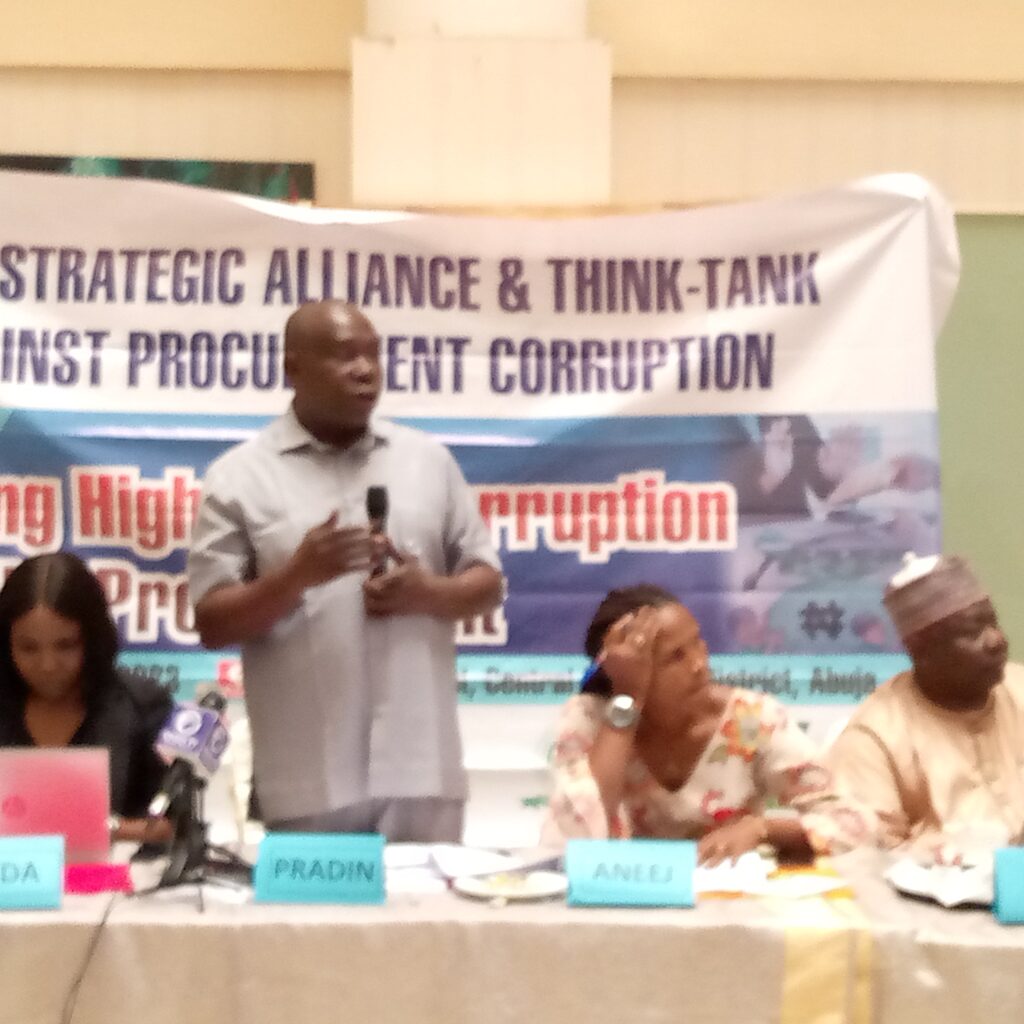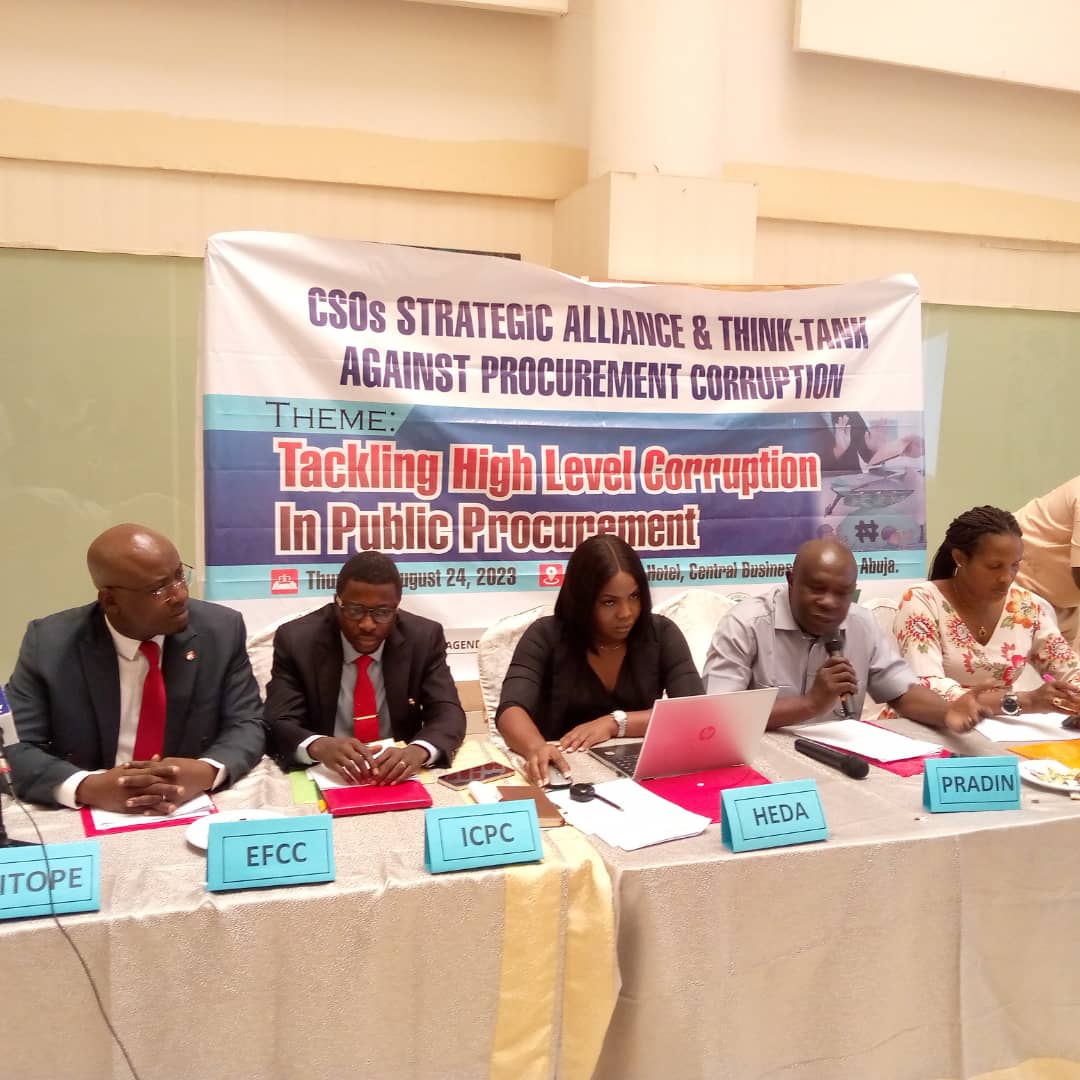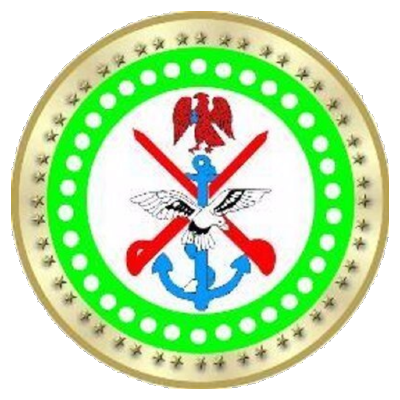By Chimezie Godfrey
A coalition of Civil Society Organizations in the lead of the anti-corruption fight in Nigeria has advocated for a sustained collaboration with anti-graft agencies among other stakeholders to curb procurement corruption.
The Coalition at a One-Day CSOs Strategic Alliance & Think-Tank Against Procurement Corruption with the theme,” Tackling High Level Corruption In Public Procurement” held on Thursday in Abuja, noted with great concern that procurement corruption accounts for over 70% of total corruption in the public sector.
The National Coordinator, Procurement Observation and Advocacy Initiative (PRADIN), Mohammed Bougei Attah stated that the roundtable was informed by the rising cases of corruption that appear to have defied all forms of prescriptions despite huge investments both in human and material resources to fight the menace.
Attah stressed that the saying that corruption often fight back seem to have taken a new dimension.”Today corruption is not only fighting back, it appears to be winning the fight,” he lamented.

He noted that the theme of the Roundtable which was centered on procurement corruption was informed by a research conducted in the year 2010 by the NGO Network, a national CSO working with the three sectors of the economy, identified that procurement corruption either by acquisition or disposal accounts for over 70% of total corruption in the public sector, adding that this is related to processes in the system.
Attah disclosed that the intention of the roundtable was to engage the fight against corruption, especially procurement corruption with a new strategy bringing together key stakeholders which include the implementers, the regulators and the monitors to share ideas and strategies to address the menace.
He said that they equally intended to support the anti-corruption agencies to get better results in their effort in addressing the challenge of corruption in the country.
He said,”The Roundtable therefore is the initiative of Procurement Observation and Advocacy Initiative (PRADIN) in collaboration with Civil Society Legislative Advocacy Centre (CISLAC), Africa Network for Environment and Economic Justice (ANEEJ) and Human and Environmental Development Agenda (HEDA). PRADIN is a select group of 50 non-state actors, trained under the 2010 Federal Government of Nigeria-World Bank Economic Reforms and Governance Project (ERGP), while CISLAC, ANEEJ and HEDA are endowed for their fight in the downstream and upstream sectors, high level institutional corruption election and other political corruption issues.
“These four (4) leading CSOs on anti-corruption fight therefore resolved to engage the fight with a new strategy by bringing the key stakeholders – the implementers, the regulators and the monitors to a facilitated meeting, by creating the space for all to share ideas and strategies on how to address this ugly tendency further.
“We are of the belief that no one can solve this problem for us other than ourselves, and we must commit to nationalistic zeal in addressing the issue. It is therefore important to inform that this meeting has been put together by these four CSOs without external funding, either by government or development partners. It demonstrates our commitment to this course.
“The main objective of the roundtable as contained in the Concept Note (CN) sent earlier is to support the efforts of each of the stakeholders present here, particularly the Anti-Corruption agencies in achieving improved results. Ultimately, our hope is to set an agenda for fast-tracked reduction in corruption cases in Nigeria by tackling procurement corruption with all our apparatuses.
“Our intension is to move from confrontation to consultation, therefore we hope with the team of experts here, the presentation and discussion will provide us with practical solutions in meeting the goal of the roundtable.”
The Procurement Expert urged those who are in the category of monitors to avail the roundtable of their ideas, suggestions and recommendations that would help move Nigeria to a better nation.
He appealed to the stakeholders for synergy to tackle the issue of procurement corruption in the country.
“We himbly appeal to all of you, to give us the enabling space to work with you at your various establishments as we hope to engage this issue of procurement corruption beyond this roundtable,” he appealed.
In a goodwill message, the Director General, Bureau of Public Service Reforms (BPSR), Mr Dasuki Arabi
extended his appreciation to the organizers of the event.
Arabi noted that the Procurement Act was for the enthronement of efficiency, accountability, integrity and transparency in government procurement and financial management systems.
He said part of the Federal Government effort to close the leakages and anomalies in the procurement process prior to what subsists before the year 2000, was the review of the Procurement Act, through the support of the world Bank to ensure the enthronement of efficiency, accountability, integrity and transparency in government procurement and financial management systems.
“It is pertinent to state that the Procurement Act was greatly inspired by the country’s Procurement Assessment Report(CPAR), conducted by both international and national consultants, where major recommendations that highlighted the weaknesses of the then existing procurement system identified amongst others; Lack of modern legislation to provide oversight on the guidance and monitor of purchasing entities, inadequacies in the 1958 Finance(control and management Act), need to revise the financial regulation, streamline Tender Boards and functional authority to award contracts, need to rebuild the procurement and financial capacity in the public sector.
“Consequently, this culminated to the enactment of the Public Procurement Act 2007, which established the National procurement Council of Public Procurement and the Bureau of Public Procurement as the authority responsible for monitoring and oversight of public procurement.
“The objective of the Procurement Act 2007 was to amongst others achieve cost – effectiveness, ensure quality control, and timely delivery of goods and services.
“Governments over years have not rested on its oars to ensure a transparency and openness in the public financial system by evolving amendments in the procurement Act and introducing other policies to tighten the financial system against undue leakages and corrupt practices,” he said.
He noted that the anti-craft agencies have been on top of their task at uncovering illicit acts that undermine the procurement procedures across public Institutions.
“In addition, the Public Procurement Act by the provisions laid by the Bureau of Public Procurement(BPP) requires MDAs to publish their procurement transaction in the Procurement Portal. (NOCOPO).
“At this juncture, I wish to commend the Civil society organizations on their quest to hold government accountable through enquiries such as the procurement processes. Indeed, it has become a bench – mark to rank the performance of MDAs on integrity and transparency Index by Civil Society Organizations.
“As a country we may not have reached that level of perfecting the process, but its apt to state that remarkable and significant improvements have been recorded in the public procurement processes in Nigeria resulting to huge savings.
“I urge all participants to feel free to share their perspective on how to advance the procurement system, and envisage that outcomes from this national dialogue would provide pathways towards addressing gaps in the procurement process in Nigeria”, he said.
Also speaking, the Chairman of Human and Environmental Development Agenda (HEDA Resource Centre), Mr. Olanrewaju Suraju. represented by Legal officer, HEDA, Cecilia Ogwuche, decried the fact that for over six decades since Nigeria’s independence on October 1st, 1960, the country’s teeming potential has been held back by the corrosive effects of corruption, “the menace has drained resources and hindered our growth”.
Suraju stressed that high-profile corruption cases are not just legal matters; “they are grave offenses that erode public trust, divert resources from essential services, and stifle our country’s progress”.
He therefore said that understanding the importance of transparent, accountable, and equitable procurement processes was paramount in preventing such occurrences.
The HEDA Chairman lamented that Nigeria have witnessed not just millions but billions and trillions of foreign currency looted from public coffers by Nigerians and their foreign conspirators.
He however expressed optimism that despite the challenges of endemic corruption that there was still hope for Nigeria.
“Amidst these challenges, there is still hope for Nigeria. Ongoing reforms, legal amendments, and civil society’s active participation indicate our determination to break free from corruption’s grip. “Re
cent events like the UK National Crimes Agency ultimately charging Nigeria’s former Minister of Petroleum, Diezani Alison-Madueke, with bribery offenses during her tenure, emphasize the necessity of international cooperation.
“HEDA is proud to be an active player in the tracing of several of the assets listed in the charges and consistent engagement of Nigeria’s EFCC and UK-NCA in the process leading to this ultimate prosecution for some of the unbelievable abuse of office by any appointed or elected official in the history of Nigeria.
“As we navigate these grave matters, let’s acknowledge the essential role of civil society organizations and think tanks. Our mission is to vigilantly monitor and expose corruption, advocate for accountability, and drive policy reforms that safeguard our nation’s interests.
“In conclusion, the prevalence of high-profile corruption cases in Nigeria, particularly in the realm of public procurement, highlights the urgent need for comprehensive reforms. By fostering collaboration among CSOs, think tanks, and government agencies, we can work toward a Nigeria where integrity, transparency, and accountability prevail,” he said.






